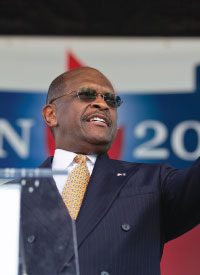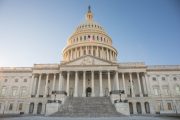
Some elements of the Tea Party movement quickly latched onto Cain’s candidacy — basking in his relatively conservative rhetoric, his harsh criticism of President Obama, and his perceived status as a political outsider. Some of that early enthusiasm, however, began to fade as Cain made the rounds on TV and talk radio.
His position on the war in Afghanistan has been one of the main issues dogging his candidacy. That’s because he has repeatedly refused to explain what it is, claiming he would need access to “classified information” before deciding what to do. “Ever since the South Carolina Republican presidential debate, reporters have continued to challenge me for not having a specific plan for our nation’s involvement in Afghanistan,” he explained in a statement. “They continue to think that if you are running for president then you must have an answer for everything. I don’t!”
But on some issues, Cain has expressed his thoughts unambiguously. And for many conservatives, particularly strict constitutionalists, the picture is troubling — especially when it comes to the Federal Reserve and adherence to the Constitution.
Cain served as the chairman of the Kansas City Federal Reserve Bank during the mid ’90s, emerging as a vocal defender of the central banking system in the years since then. During a radio interview earlier this year, he insisted that the institution is not unconstitutional because it was created by congressional statute.
While acknowledging that he didn’t agree with all of its current policies, Cain has been firm in his defense of the Fed as an institution, insisting that it cannot be abolished. “What would you replace it with?” he asked rhetorically as justification for his position. Cain also criticized Ron Paul’s opposition to the Fed by falsely claiming that the Texas Republican and fellow 2012 contender had not proposed an alternative.
On top of his advocacy on behalf of the Fed as an institution, Cain has also expressed opposition even to a congressional audit of the Fed that would allow Congress and the American people to find out what exactly is going on at the central bank. He suggested contacting one of the Fed’s “PR people” if Americans wanted answers. Making matters worse for supporters of the growing anti-Fed movement, Cain said an audit was “not necessary” and that calls for government oversight were simply the product of ignorance.
In recent years and months, a great deal of secret information about the Fed has become public. The institution was, for example, clandestinely bailing out foreign banks — including one owned by the Libyan dictatorship of Moammar Gadhafi — with trillions of dollars. Meanwhile, it was manipulating the markets for stocks, bonds, real estate, precious metals, and more.
A bipartisan bill to audit the institution was cosponsored by about three-fourths of the House and supported by more than 80 percent of Americans. But presumably a President Cain would veto such a measure. Candidate Cain did eventually say that he would support some sort of gold standard managed by the Fed. But few details have been supplied, and first, Cain explained, the national debt would have to be reduced.
In addition to central monetary planning, Cain has also been an ardent supporter of various bailouts, especially the so-called “banker bailout” of 2008, officially known as TARP. An opinion column he wrote during the height of the debate blasted “free market purists” for opposing the $700 billion program. “Wake up people! Owning a part of the major banks in America is not a bad thing,” Cain opined, claiming opposition to the plan stemmed from “economic illiteracy.”
In the same piece, Cain also praised the actions of the Federal Reserve and the Treasury for showering certain banks with taxpayer money. “Congress needs to just shut up” for the “collective actions to work,” he said. The U.S. Constitution was never mentioned in the column.
Another controversial position taken by Cain — popular among some likely GOP voters but deeply troubling to others — is an extraordinarily hostile attitude toward Islam that goes far beyond mere criticism or disagreement. Cain’s views on the subject first attracted scrutiny when he suggested that his administration would not appoint any Muslims to the executive or judicial branches.
Reporters were quick to highlight the text of the Constitution, which states that “no religious test shall ever be required as a qualification to any office or public trust under the United States.” Cain later backtracked slightly, saying he would not appoint “radical” Muslims and that his comments had been “misconstrued.”
Then he went even further in mid-July during an interview on Fox News, suggesting that Americans have a “right” to ban the construction of mosques — and not just the one near ground zero in New York. “Our Constitution guarantees separation of church and state,” he said. “Islam combines church and state.”
Among the values and ideas Cain says he supports are “strong national defense” and the so-called “Fair Tax,” a progressive national sales tax. On his website, “The Issues” section lambastes out-of-control government spending but does not offer any concrete examples of what a Cain presidency would seek to cut. He also says he is pro-life and that his administration would always stand by Israel.
Another position his campaign has featured prominently is opposition to illegal immigration. “We must secure our borders, enforce our laws and promote the existing path to citizenship,” Cain’s website explains. During his official candidacy announcement on May 21, he complained about the Obama administration’s lawsuit against the State of Arizona, saying, “We ought to send them a prize.”
On healthcare, Cain has said that he would work to repeal ObamaCare and replace it with other types of reform. One of the few specific proposals he has offered is tort reform to limit frivolous lawsuits, which he said would reduce the cost of healthcare. But he publicly offered support for his favorite candidate in 2008: Mitt Romney, famous for his Massachusetts version of ObamaCare now known as Romneycare, as well as for other big-government schemes. Cain has also criticized federal entitlement programs, but again has failed to offer a clear alternative or even specific proposals about what should change.
While originally touted by much of the media as a “Tea Party favorite,” in interviews, Cain has distanced himself from the movement. In fact, he specifically rejected the Tea Party label for an article in the Wall Street Journal. Instead, he styles himself a “citizen’s candidate.”
Cain does attempt to portray himself as a D.C. outsider, and indeed, he has never held elected office despite running a failed bid for a U.S. Senate seat from Georgia in 2004. But as the political transparency group Open Secrets noted, Cain “is no stranger to Washington’s world of money in politics.” Cain has actually donated to a broad array of political campaigns. Democrat U.S. Senator Ben Nelson of Nebraska and Danny Tarkanian, Nevada Tea Party candidate Sharron Angle’s primary opponent, have both benefited from his largesse. So have many others.
Outside of politics, Cain, 65, has been generally successful, having worked for numerous large companies with a good track record. One of his biggest achievements was his success as the former CEO of Godfather’s Pizza, a company that Cain reportedly helped save from the brink of bankruptcy. He has also served on the boards of various firms including Hallmark and Whirlpool, in addition to hosting a radio talk show and doing some lobbying work for the restaurant industry as the head of the National Restaurant Association.

